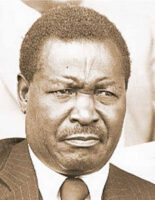
Moses Substone Budamba Mudavadi, as an influential member of President Daniel arap Moi’s government, was known as the only person other than the President to receive ‘delegations’ at his residence. He bore the nickname King of Mululu in reference to the village of his birth. Even diplomats who wanted to quickly pass certain messages from their countries to State House reportedly paid courtesy calls on him at home instead of going to the Foreign Affairs ministry.
Mudavadi held four Cabinet positions at various times during his tenure in Parliament. These were Basic Education, Water Development, Culture and Social Services, and Local Government and Physical Planning. He also served as KANU Secretary General.
Born in 1923 in Sabatia, Mudavadi attended the old Kima Boys Secondary School before joining Maseno School and then Alliance High School. For his tertiary education, he studied at Leeds and Harvard universities. He served briefly as a warrant officer in the King’s African Rifles before becoming a teacher, later rising to the position of District Education Officer in western Kenya and Rift Valley Province before being appointed Nairobi’s first provincial education officer.
During his time working for the Ministry of Education in the Rift Valley, Mudavadi met Daniel arap Moi, a teacher at the time, and a strong friendship developed.
As a schools inspector stationed in Kabarnet and in charge of Baringo among other areas, Mudavadi recommended the future President for an in-service course that paved the way for his promotion. Mudavadi also influenced decisions to appoint Moi as head of the Kabarnet Intermediate School and to repr
esent the Rift Valley in the Legislative Council.
Mudavadi ventured into politics in 1969 but failed to win the Vihiga parliamentary seat. He was also unsuccessful in his second attempt in 1974. He lost the seat to Peter Kibisu who was subsequently convicted on an assault charge. Mudavadi won the 1976 by-election and his long-term friendship with the President proved useful in his political career.
By all accounts, Mudavadi was an active and effective Minister at all the ministries he headed, although his tenure in the Cabinet was not without controversy. He joined Parliament at a time when a group of politicians were trying to change the Constitution to block Moi, then the Vice President, from succeeding President Jomo Kenyatta. Mudavadi backed his friend, a decision that worked well for him when Moi became President in 1978.
He was appointed to the Cabinet in 1979 as Minister for Basic Education in charge of teacher training colleges and schools. During Mudavadi’s time at this ministry he sorted out delayed payments for teachers in Lodwar District. However, he was accused of admitting mostly people from his home area to teacher training colleges and was accused of the same when he was moved to Water Development in 1980. Despite the public outcry, he was not fired.
Although his stay at the Ministry of Water Development was somewhat controversial, Mudavadi worked to improve the water situation in drought-stricken areas of the country. The solution at the time was using water tankers to supply water, but they were not enough to deal with the situation. The Minister indicated that the tankers were a temporary measure and that the ministry was looking into implementing more permanent solutions such as dams and boreholes.
In 1992 Mudavadi was moved to the Ministry of Culture and Social Services. Women’s issues fell under this docket. He was instrumental in urging Maendeleo ya Wanawake, the women’s development organisation, to ensure that its efforts resonated in the rural areas.
Mudavadi is perhaps best remembered as Minister for Local Government, a position he was appointed to in 1983. Once again, his time there was not without controversy. At one point he over-nominated councillors in civic authorities, exceeding the one-third ratio stipulated. A Validation Bill was quickly approved in Parliament to regularise the anomaly.
In 1982 the Minister disbanded many wayward civic authorities in the country, establishing commissions in their place. The biggest casualty was Nairobi whose Mayor, Nathan Kahara, was dismissed along with all his councillors. A commission headed by John Ramtu was established to run the affairs of the capital, a situation that remained in place for the next 10 years until 1992. With the reintroduction of multipartism, elective councils under mayors returned to City Hall.
A man of few words, Mudavadi was feared by some and loved by others. He used his influence in each ministry to ensure people from his home area were hired. While this angered many of his colleagues, it endeared him to the people in western Kenya. He left an indelible mark on Vihiga County, hiving off Vihiga District from the larger Kakamega, and inaugurating the Maragoli Cultural Festival in 1982, a tradition that still thrives today. After an illustrious career in the Civil Service and in politics, Mudavadi died in 1989, aged 66 years. His funeral was attended by President Moi and many dignitaries. His son, Wycliffe Musalia Mudavadi, carried on the legacy by going into politics and is today a prominent politician.
